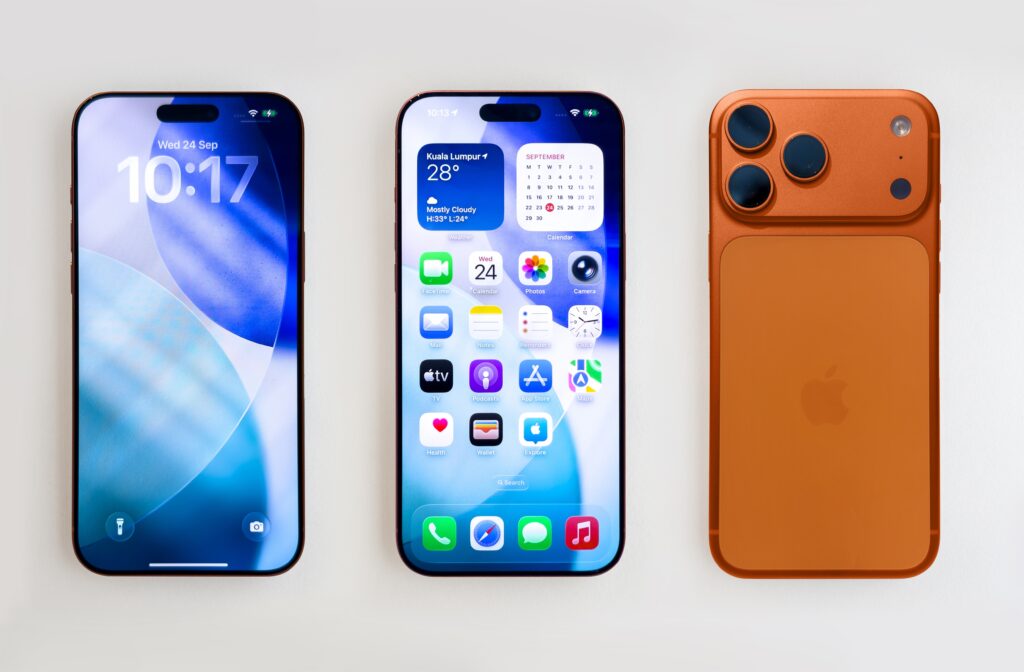Surging demand for iPhones lifted Apple’s revenue in the final quarter ending in September, closing its fiscal year with record profits. Apple posted stronger-than-expected financial results despite facing a global trade war and racing to match Big Tech rivals in artificial intelligence.
The company credited its success to powerful initial demand for the iPhone 17 series, which launched last month. “Apple proudly reports a September-quarter revenue record of $102.5 billion, including all-time highs for iPhone and Services,” said CEO Tim Cook.
Driven by iPhone sales, Apple earned $27.5 billion (€23.8bn), nearly doubling last year’s profit. The stock rose 2% in after-hours trading following the announcement.
Although the iPhone 17 lacks the AI features of Samsung and Google devices, Apple refreshed its design with a sleek “liquid glass” display. The company held prices steady despite $1.1 billion (€950m) in tariffs on US-bound devices made in India and China, expecting another $1.4 billion (€1.2bn) in tariff costs this quarter.
Consumers across the US and Europe drove iPhone sales to $49 billion (€42.4bn) between July and September, a 6% yearly increase. Analysts had expected 8%, following a 13% rise in the previous quarter.
Ben Barringer of Quilter Cheviot reported, “Mac sales climbed 12%, iPhone sales rose 6%, but iPad and wearables stayed flat.” He noted weakness in China, where sales fell 4% because of forecasting errors and limited supply.
IDC estimated that Apple sold 58.6 million iPhones globally, ranking second behind Samsung’s 61.4 million. For the fiscal year ending in September, Apple achieved a record net income of $112 billion (€96.8bn), up 20% from last year.
Holiday Outlook Promises Strong Momentum
Tim Cook told analysts he expects the iPhone 17 series to keep thriving through the holiday season. Apple projects at least a 10% increase in iPhone sales compared with last year’s holidays. Chief Financial Officer Kevan Parekh forecasted total revenue growth at a similar rate.
“Apple’s Q1 guidance of 10–12% revenue growth looks solid going into the Christmas season, supported by demand for the iPhone 17,” said Barringer.
Market Reactions and Investor Concerns
Apple’s stock surged after research firm IDC reported record iPhone sales in its preliminary analysis earlier this month. The rally pushed Apple’s market value above $4 trillion for the first time, setting the stage for another potential high in Friday trading.
However, Apple trails in the AI race, while Nvidia recently became the first company to reach a $5 trillion valuation. Apple had pledged new AI features for last year’s iPhones but delivered only a few, delaying the Siri overhaul until next year.
Barringer questioned whether Apple can sustain investor enthusiasm. “With China uncertainty and faster growth from Microsoft and Nvidia, some investors may shift away in the short term,” he said.
Still, Apple often lags early in tech shifts before rebounding as a leader. If it integrates advanced AI across future iPhones, Wedbush analyst Dan Ives predicts the company’s value could rise by $1 trillion (€860bn) to $1.5 trillion (€1.3tr), adding $75 to $100 per share.


